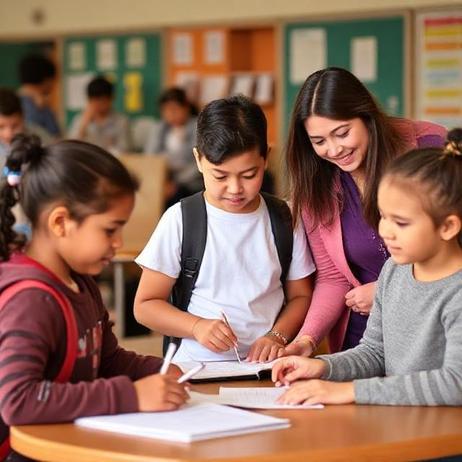Parental Involvement and Its Impact on Public School Outcomes
Parental involvement remains one of the most consistent predictors of student success in public schools. In 2025, as districts continue to navigate academic recovery, staffing shortages, and changing instructional models, parental involvement has become even more central to strengthening public school outcomes. Whether through daily communication, participation in school decision making, or support at home, parental involvement provides a foundation that improves academic achievement, attendance, behavior, and overall school climate.
This article examines how parental involvement shapes public school outcomes today, why some communities face persistent gaps, and what effective engagement strategies look like across diverse school settings. Throughout the discussion, the term parental involvement appears frequently to reflect the depth of its influence and to support clear SEO alignment for readers seeking research based guidance.
Why Parental Involvement Matters in 2025
Research consistently shows that parental involvement influences student performance regardless of income level, school size, or geographic region. Studies highlighted on Public School Review underline that strong parental involvement improves reading growth, math proficiency, attendance, and graduation rates. In 2025, public schools are leveraging this relationship more deliberately to close learning gaps that expanded during the pandemic years.
Parental involvement remains essential for several reasons.
It builds academic routines at home.
It supports communication between teachers and families.
It reinforces student motivation and accountability.
It strengthens school wide expectations for behavior.
It expands community trust in public institutions.
Every one of these outcomes is closely tied to consistent parental involvement, which helps schools maintain stability and encourages students to take ownership of learning.
How Parental Involvement Shapes Academic Achievement
Academic achievement remains the most widely discussed area affected by parental involvement. When families engage meaningfully with schools, students show measurable gains in literacy, numeracy, and critical thinking. Parental involvement reinforces learning strategies, supports homework habits, and improves executive functioning skills that students rely on throughout their schooling.
A comparison of districts across several states shows that parental involvement produces stronger gains when it includes regular home based routines. These routines include reading with children, talking about school goals, and monitoring study time. Teachers often cite that parental involvement gives students a sense of continuity between home and school, which reduces confusion about expectations and leads to more consistent academic performance.
Current state level data cited in this overview of U.S. public schools shows that districts with higher levels of parental involvement report stronger reading and math proficiency. Many superintendents have noted that parental involvement is particularly crucial in early grades because foundational literacy forms the basis of later academic success.
Parental Involvement and School Attendance
Regular attendance remains one of the strongest predictors of long term academic outcomes. In 2025, chronic absenteeism continues to affect public schools nationwide, especially in large urban districts. Administrators have found that parental involvement significantly reduces absenteeism by strengthening school family communication and promoting consistent routines at home.
Attendance improves most in communities where schools hold parent workshops, provide multilingual outreach, and coordinate support services with social agencies. Parental involvement reinforces the value of daily participation and helps schools respond quickly to barriers like transportation difficulties or health concerns.
Parental involvement also improves early warning systems. When parents understand how absences affect instruction, they are more likely to intervene early or seek support. Schools with proactive parental involvement teams report fewer unexcused absences and stronger overall engagement.
Parental Involvement and School Climate
School climate has become a critical focus area for districts responding to mental health needs and behavioral challenges. Strong parental involvement supports healthier climate by promoting shared expectations and by giving students a sense of safety and belonging.
Positive school climate correlates with:
Improved student behavior
Lower suspension rates
Higher levels of teacher satisfaction
Stronger peer relationships
Increased willingness to seek help
Parental involvement reduces misunderstandings between families and schools, which strengthens trust and reduces the likelihood of disciplinary conflict. Teachers report that parental involvement helps them recognize early signs of social emotional issues, leading to faster intervention.
Districts that emphasize parental involvement in school governance, such as parent advisory boards, also report more stable enrollment and stronger teacher retention. These findings align with emerging studies documented in Public School Review’s research section.
Why Some Communities Struggle With Parental Involvement
While parental involvement benefits students, barriers persist across many public school systems. Economic inequities, language differences, work schedules, and transportation limitations all affect a family’s ability to participate. For many communities, parental involvement is not a lack of interest but a lack of capacity or available time.
Some of the most common obstacles to parental involvement include:
Limited access to childcare
Unpredictable or inflexible work hours
Limited English proficiency
Lack of transportation to school events
Feelings of intimidation or distrust based on prior school experiences
School leaders increasingly acknowledge that parental involvement requires flexible and inclusive strategies rather than expecting families to participate in traditional ways.
Hybrid communication models and virtual meeting formats are now standard practice. When implemented well, these models expand parental involvement by giving caregivers more options for contacting teachers, joining meetings, or accessing student performance data from home.
Effective Strategies to Strengthen Parental Involvement
Public schools that have improved outcomes in recent years often credit strategic initiatives designed to increase parental involvement. These strategies are most effective when they reduce barriers and encourage families to engage at multiple levels.
Below is a summary table outlining several evidence based approaches.
| Strategy | Impact on Public School Outcomes |
|---|---|
| Multilingual communication systems | Improves parental involvement among diverse families and leads to higher attendance rates |
| Flexible meeting formats | Expands parental involvement across working families and strengthens school climate |
| Home learning resources | Reinforces academic development and boosts core skill mastery |
| Parent teacher partnership teams | Increases trust and supports consistent behavior expectations |
| Community based support networks | Enhances parental involvement for families facing economic barriers |
Districts have reported that parental involvement improves significantly when schools schedule family nights connected to curriculum, create simple digital communication channels, and offer workshops on adolescent development or special education services.
A growing number of districts use data dashboards to help parents monitor progress. These tools make parental involvement more proactive because families can see attendance patterns or grade changes in real time.
For additional context on how public schools serve diverse communities, readers can explore Public School Review’s demographic resources.
Parental Involvement in Special Education
Special education programs rely heavily on parental involvement, not only for legal compliance but also for effective instructional planning. Families who participate actively in Individualized Education Program meetings help educators create more accurate accommodations and support plans.
In 2025, special education directors emphasize that parental involvement improves communication between general education teachers, specialists, and service providers. It also prevents misunderstandings about learning needs and ensures that interventions remain consistent across home and school environments.
Barriers remain significant. Some families feel overwhelmed by the complexity of special education regulations, so schools have begun offering parent navigators who support parental involvement through one on one guidance.
Strong parental involvement in special education correlates with better literacy outcomes, improved social skills, and smoother transitions into middle and high school.
Parental Involvement and Student Mental Health
Student mental health remains one of the most pressing issues facing public schools. Parental involvement plays a central role in identifying early warning signs, supporting counseling referrals, and reinforcing coping strategies at home. Counselors report that parental involvement improves continuity of care and reduces stigma related to mental health support.
Schools that build mental health programming around parental involvement typically host workshops on stress management, peer conflict, and digital wellness. These programs help families navigate the social pressures that many students face, especially in the upper grades.
In districts that have expanded partnerships with community health providers, parental involvement ensures that families understand available services. These partnerships are especially effective in rural regions where mental health resources are limited.
What Public Schools Can Do Next
Public schools are entering another period of change as they balance academic recovery with long term planning for technology integration, curriculum development, and student services. Parental involvement gives schools a critical advantage because families help shape programs that reflect community needs.
Administrators report that the most successful schools maintain frequent outreach, adopt transparent communication practices, and create leadership opportunities for parents. Parental involvement also improves staff morale because teachers feel more supported in their work.
As districts plan for the next decade, parental involvement will remain a central factor in improving public school outcomes. Strong parent school partnerships help create safe, academically rigorous, and inclusive environments that benefit every student.
To continue learning about trends shaping today’s schools, readers may explore an additional resource on public school challenges and opportunities.
By building systems that honor family voices, reduce barriers, and encourage meaningful collaboration, public schools can ensure that parental involvement remains a powerful driver of student success well into the future.















